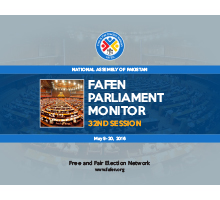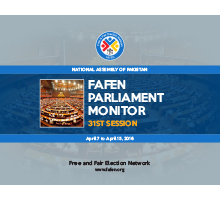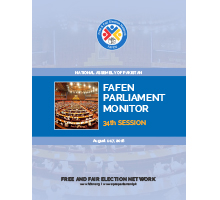The National Assembly passed a Constitutional amendment and eight other government bills besides discussing the offshore businesses of Prime Minister’s family during 32nd session held between May 9 and May 20, 2016.
The cumulative duration of 10 sittings was 26 hours and 45 minutes while each sitting, on average, started nine minutes behind the schedule, continued for two hours and 40 minutes and attended by 231 members. The Prime Minister attended one sitting while the Leader of the Opposition was present in five sittings. The Speaker presided over 61% of the proceedings, the Deputy Speaker 14%, Members of the Panel of Chairpersons nine percent while the rest of the duration was consumed in suspensions and breaks.
The Parliamentary leaders of the APML and PkMAP attended 10 sittings each followed by PML-Z (8), ANP, QWP-S, Independent (7 each), JI, AMLP, (6 each), AJIP, PPPP, PML-F, BNP (5 each), PML, NPP (3 each), NP, PTI (2 each) and one by MQM. However, none of the sittings was attended by Parliamentary Leader of JUI-F.
The House took up a legislative agenda comprising 26 bills, including a Constitutional amendment and nine Private Members’ (PM) bills. Another PM bill appearing on the agenda was not taken up. The House passed nine government bills while 11 others, including three PM bills were referred to the relevant Standing Committees for further deliberations. Two PM bills were dropped due to absence of the relevant lawmakers while five such other bills were deferred on request of the movers. The approved legislation focused on economy-related matters, electoral reforms and security issues.
The House adopted six PM resolutions while one private resolution was dropped due to the absence of the sponsor and five others were not taken up by the House. The private resolutions urged the government to ensure observance of employment quota of Balochistan, complete Bara Kahu Housing Scheme for Federal Employees, control price-hike, take steps for mental health and keep check on the quality of paper used for printing of Holy Quran. Moreover, a resolution jointly sponsored by members from various political parties condemned the incidents of violence against women in the country.
The Standing and Special Committees presented 21 reports before the House during the session. Eleven of these reports were on the legislative proposals, five on different issues of public importance while three were on periodical performance of the committees. The Committee on Rules of Procedure and Privileges presented the report of the committee regarding increase in the salaries of Speaker/Chairman Senate, Deputy Speaker/Deputy Chairman Senate and Members of the Parliament. Moreover, the Special Parliamentary Committee on Electoral Reforms also presented its interim report.
The House referred two amendments to the Rules of Procedure and Conduct of Business in the National Assembly, 2012 to the relevant committee for further consideration while another package of various amendments proposed by lawmakers was rejected. The amendments referred to the committee sought to increase the time limit given to the committees for report on legislative proposals and to provide for the Committee of the Whole House. The amendments rejected by the House had proposed to devise a mechanism for public petitions in the National Assembly.
The Prime Minister made a statement before the House during sixth sitting regarding his family’s offshore businesses mentioned in Panama Leaks. The lawmakers from both sides of the floor discussed the issue for three hours and 12 minutes.
Eight Calling Attention Notices (CANs) appeared on ‘Orders of the Day’ during the session. The relevant ministers or their parliamentary secretaries made statements on six of these notices while two notices were not taken up by the House.
The Question Hour was held during four sittings only. The lawmakers asked 419 questions during the session, including 269 starred and 150 unstarred. The rules require the government to answer a starred question orally as well as in writing while the unstarred questions are to be replied only in writing. However, only nine percent of the starred questions (24) were taken up and responded to on floor of the House. These questions were addressed to 34 government ministries and departments with highest number of questions posed to the Ministry of Water and Power (76) followed by Ministries of Petroleum and Natural Resources (37) and Finance, Revenue, Economic Affairs, Statistics and Privatization (34).
The lawmakers belonging to PPPP asked 104 questions, PTI (88), PML-N (80) and MQM (71). These questions were asked by 62 lawmakers, half of whom were females.
The House discussed only one Motion under Rule 259 regarding the elimination of interest from the country while remaining nine motions were not taken up. The discussion on the elimination of interest consumed 23 minutes of the proceedings.
The House observed one-minute silence to honor slain member of provincial assembly of Khyber-Pakhtunkhwa Dr. Sardar Soran Singh.
Members elected from NA-245 Karachi-VII and NA-267 (Kachhi) took oath under Article 65 of the Constitution of the Islamic Republic of Pakistan and signed the Roll of MNAs.
Meanwhile, a Motion under Rule 244(B) seeking constitution of a Special Committee to probe into cases of writing off loans during last three years was rejected by the House.
The lawmakers raised 138 Points of Order consuming seven hours and 25 minutes of the session’s duration and discussed various issues related to the governance, security, development and business of the House.
The Opposition parties boycotted the proceedings of the House for half of the session in protest against the absence of the Prime Minister from the Parliament. FATA lawmakers staged a walkout to show solidarity with teachers from their region who had been protesting for their service structure. MQM lawmakers also registered their protest against the Karachi Operation by staging walkout during seventh sitting.
The lack of quorum persisted during first half of the session and caused suspension of the proceedings on five occasions.
To download complete report, click here




